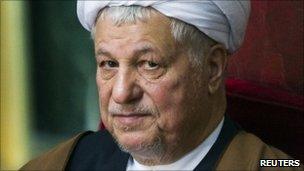Iran's Rafsanjani suffers strategic defeat
- Published

Rafsanjani can either retire or move closer to the opposition
Iran's leading pragmatic politician, Akbar Hashemi Rafsanjani, has lost his position as head of the country's highest clerical body after withdrawing his candidacy during the latest election in the Assembly of Experts.
This could signal the beginning of the end of the political career of this leading moderate technocrat within the system.
Mr Rafsanjani's decision to step down strengthens the position of President Mahmoud Ahmadinejad and his right-wing allies.
Mr Rafsanjani's seat goes to a traditional conservative rather than an Ahmadinejad loyalist, Ayatollah Mohammad Reza Mahdavi Kani. He was supported by senior assembly clerics in an intense election campaign, winning 63 votes in the 86-member chamber.
The Assembly theoretically appoints and supervises the country's supreme religious-political leader, currently Ayatollah Ali Khamenei.
In practice, its elderly clerics are handpicked by the state and have no supervisory role.
Family pressure
Mr Rafsanjani is now almost out of the political establishment, and can either retire or move closer to the opposition. He might even become the most senior dissident cleric, not unlike the late Ayatollah Ali Montazeri.
The 76-year-old Mr Rafsanjani had hitherto been an unyielding political player. Defeated in the 2004 parliamentary (majlis) poll and the 2005 presidential election, he refused to quit.
He remains head of the Expediency Council, which arbitrates between the majlis and its supervisory constitutional body. But the Council's term ends early next year and it is uncertain whether Mr Rafsanjani will be able to retain his position there either.
If the current trend continues, Mr Rafsanjani and his family could be facing further decline. In the past two years he has lost his role as Tehran Friday prayers leader and his grip on the wealthy Azad University.
One of his sons recently resigned as chief of the Tehran Metro, while another lives abroad for fear of a political trial. His daughter was detained temporarily in a February street protest and a video of her being subject to verbal abuse has been posted on YouTube.
Blow to reformers
Mr Rafsanjani's defeat represents a major victory for the right. They have been campaigning since 2005 to remove this dangerous rival.
They accused him of failure to support the government, stand against the opposition and remain loyal to the Supreme Leader Khamenei. A media assault accused him of financial corruption, called him a seditionist and chants of "Death to Rafsanjani" were broadcast on state television.
However, the right apparently felt it was not strong enough to challenge him directly. It had to support another conservative centrist, Mr Kani, to force him out.
Mr Rafsanjani's absence will deny the reformers an advocate at the heart of the political process and will narrow their options. He could have played a critical role in brokering an understanding between the government and opposition.
Since the disputed 2009 presidential election, Mr Rafsanjani had taken the centre ground in the standoff between the establishment and the dissident Green Movement.
On one hand, he has articulated the movement's basic demands and been in contact with its leaders. On the other, he has carried out his official duties and occasionally condemned "sedition".
Khamenei at risk
Mr Rafsanjani's elimination means the collapse of a dissident bulwark and gives Supreme Leader Khamenei more room to manoeuvre.
But it also raises the possibility that Mr Rafsanjani could be pushed into opposition or that the right could now put pressure on Mr Khamenei himself.
A month ago, Mr Rafsanjani sat beside Mr Khamenei at the Revolution Day ceremony, the country's most important annual event. This showed how publicly the Supreme Leader was prepared to acknowledge Mr Rafsanjani's status. But it is unlikely that the assembly ouster could have happened without his approval.
In the build-up to the assembly elections, both the right and the Rafsanjani supporters tried to portray Mr Khamenei as their ally.
The Rafsanjani camp said the supreme leader had told him to stand in the elections. Mr Ahmadinejad's supporters said the leader had not expressed an opinion.
The Assembly of Experts is dominated by traditional conservatives. They withdrew their support from Mr Rafsanjani over his opening to the opposition.
Turning against one of their own will alienate the pro-Rafsanjani elements and leave the assembly divided and weaker.
The traditional conservatives took the lead in his ousting, but in doing so they moved closer to the right and thus might have undermined their own electoral appeal.
This has implications for the parliamentary elections set for February 2012. The question is whether the pragmatic conservatives will be strong enough to prevent the right from taking over the majlis.
BBC Monitoring, externalselects and translates news from radio, television, press, news agencies and the internet from 150 countries in more than 70 languages. It is based in Caversham, UK, and has several bureaux abroad.
- Published8 March 2011